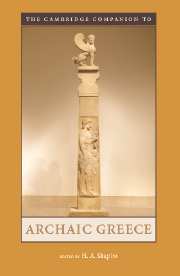7 - The Philosophers in Archaic Greek Culture
from Part 2 - Literature and Philosophy
Published online by Cambridge University Press: 28 November 2009
Summary
In his Lectures on the History of Philosophy, Hegel claims that there is a paradox inherent in the very notion of a “history of philosophy”: “The thought which may first occur to us in the history of Philosophy is that the subject itself contains a contradiction. For Philosophy aims at understanding what is unchangeable, eternal, in and for itself: its end is Truth. But history tells us of that which has at one time existed, at another time has vanished, having been expelled by something else. Truth is eternal; it does not fall within the sphere of the transient, and has no history.” Although few scholars would now endorse Hegel's solution to the problem of philosophy's “development in time,” the tension between philosophy and history still remains. For, if the notion of an atemporal and transhistorical truth is no longer in vogue, scholars who work in the “history of philosophy” nonetheless analyze philosophic texts in abstraction from the historical and cultural contexts that ground these discourses. Certainly this has been the dominant approach to the Archaic Greek thinkers, who have generally been treated as detached intellectual theorists since the time of Aristotle and Theophrastus (who wrote the first “histories” of philosophy). At the end of the nineteenth century, John Burnet famously characterized Archaic philosophy as “The Greek Miracle” - the extraordinary creation of a rational mode of thinking radically distinct from the discourse and “mythic” mentality of Greek culture.
- Type
- Chapter
- Information
- The Cambridge Companion to Archaic Greece , pp. 169 - 198Publisher: Cambridge University PressPrint publication year: 2007
- 3
- Cited by



